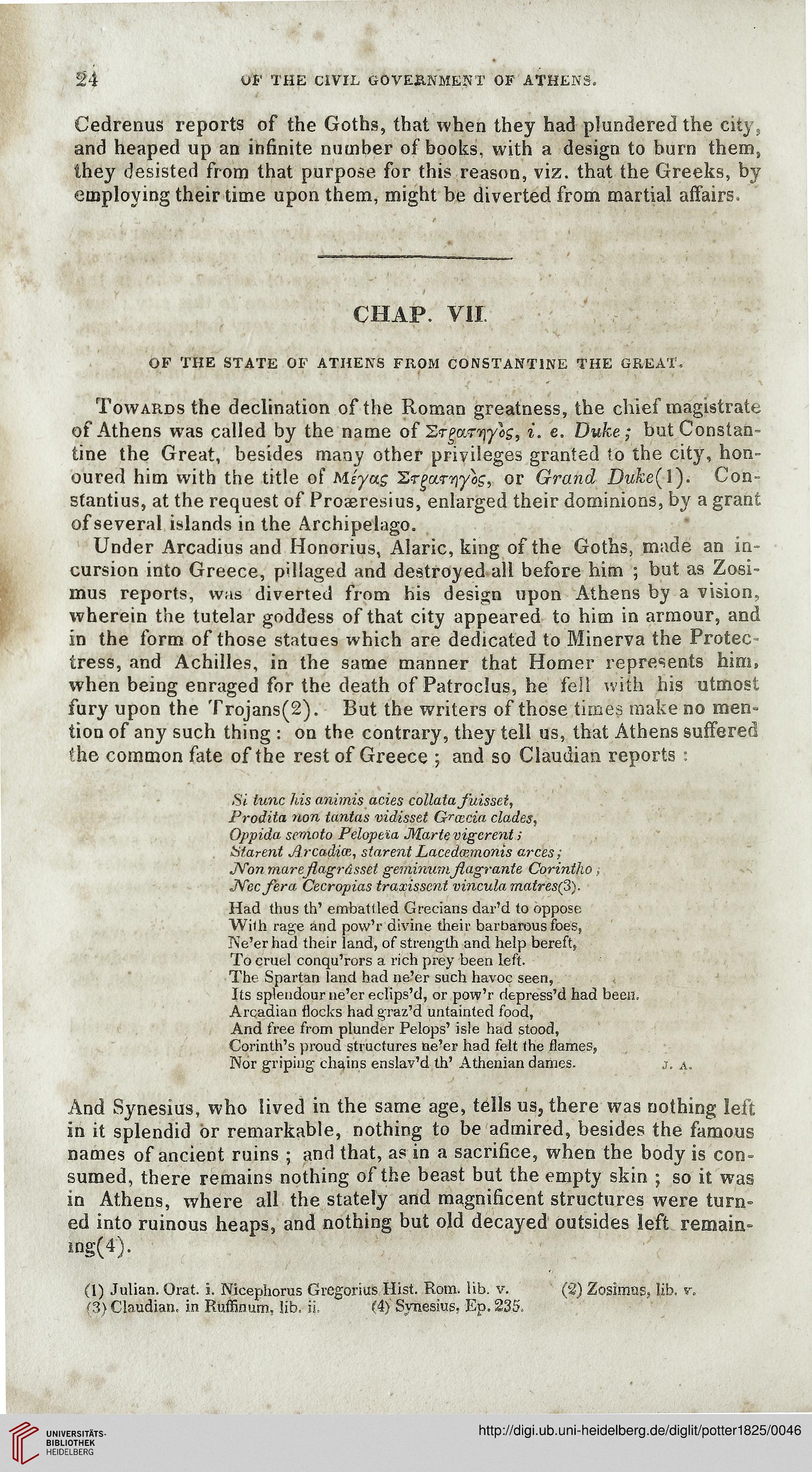24
uf the civil government of athens.
Cedrenus reports of the Goths, that when they had plundered the citys
and heaped up an infinite number of books, with a design to burn them,
they desisted from that purpose for this reason, viz. that the Greeks, by
employing their time upon them, might be diverted from martial affairs.
CHAP. VII
of the state of athens from co n st ant in e the great.
Towards the declination of the Roman greatness, the chief magistrate
of Athens was called by the name of SrgarTjyos, i. e. Duke; but Constan-
tine the Great, besides many other privileges granted to the city, hon-
oured him with the title of Meyag Sr^ar^yos-, or Grand Duke(l). Con-
stantius, at the request of Proaeresius, enlarged their dominions, by a grant
of several islands in the Archipelago.
Under Arcadius and Honorius, Alaric, king of the Goths, made an in-
cursion into Greece, pillaged and destroyed all before him ; but as Zosi-
mus reports, was diverted from his design upon Athens by a vision,
wherein the tutelar goddess of that city appeared to him in armour, and
in the form of those statues which are dedicated to Minerva the Protec-
tress, and Achilles, in the same manner that Homer represents him,
when being enraged for the death of Patroclus, he fell with his utmost
fury upon the Trojans(2). But the writers of those times make no men-
tion of any such thing : on the contrary, they tell us, that Athens suffered
(he common fate of the rest of Greece ; and so Clauuian reports :
Si tunc his animis acies collataj'uisset,
Prodita non tantas vidisset Grcccia clades,
Oppida sevioto Pelopeia Marie vigerent >
Sfarent Ji readies, starent Lacedmmonis arces;
JVon mareflagrdsset geminumflagrante Corintko .
JVec fera Cecropias traxisscnt vinculo, matres(3).
Had thus th' embattled Grecians dar'd to oppose
With rage and pow'r divine their barbarous foes,
IS'e'er had their iand, of strength and help bereft,
To cruel conqu'rors a rich prey been left.
The Spartan land bad ne'er such havoc seen,
Its splendour ne'er eclips'd, or pow'r depress'd had been,
Arcadian flocks had graz'd untainted food,
And free from plunder Pelops' isle had stood,
Corinth's proud structures ne'er had felt the flames,
Nor griping chains enslav'd th' Athenian dames. j. a.
And Synesius, who lived in the same age, tells us, there was nothing left
in it splendid or remarkable, nothing to be admired, besides the famous
names of ancient ruins ; and that, as in a sacrifice, when the body is con-
sumed, there remains nothing of the beast but the empty skin ; so it was
in Athens, where all the stately and magnificent structures were turn-
ed into ruinous heaps, and nothing but old decayed outsides left remain-
ing^).
(1) Julian. Orat. i. Nicephorus Gregorius Hist. Rom. lib. v.
'3} Claudian. in Ruffinum, lib. ii, (4) Synesius. Ep.235.
(2) Zosimas, lib. r.
uf the civil government of athens.
Cedrenus reports of the Goths, that when they had plundered the citys
and heaped up an infinite number of books, with a design to burn them,
they desisted from that purpose for this reason, viz. that the Greeks, by
employing their time upon them, might be diverted from martial affairs.
CHAP. VII
of the state of athens from co n st ant in e the great.
Towards the declination of the Roman greatness, the chief magistrate
of Athens was called by the name of SrgarTjyos, i. e. Duke; but Constan-
tine the Great, besides many other privileges granted to the city, hon-
oured him with the title of Meyag Sr^ar^yos-, or Grand Duke(l). Con-
stantius, at the request of Proaeresius, enlarged their dominions, by a grant
of several islands in the Archipelago.
Under Arcadius and Honorius, Alaric, king of the Goths, made an in-
cursion into Greece, pillaged and destroyed all before him ; but as Zosi-
mus reports, was diverted from his design upon Athens by a vision,
wherein the tutelar goddess of that city appeared to him in armour, and
in the form of those statues which are dedicated to Minerva the Protec-
tress, and Achilles, in the same manner that Homer represents him,
when being enraged for the death of Patroclus, he fell with his utmost
fury upon the Trojans(2). But the writers of those times make no men-
tion of any such thing : on the contrary, they tell us, that Athens suffered
(he common fate of the rest of Greece ; and so Clauuian reports :
Si tunc his animis acies collataj'uisset,
Prodita non tantas vidisset Grcccia clades,
Oppida sevioto Pelopeia Marie vigerent >
Sfarent Ji readies, starent Lacedmmonis arces;
JVon mareflagrdsset geminumflagrante Corintko .
JVec fera Cecropias traxisscnt vinculo, matres(3).
Had thus th' embattled Grecians dar'd to oppose
With rage and pow'r divine their barbarous foes,
IS'e'er had their iand, of strength and help bereft,
To cruel conqu'rors a rich prey been left.
The Spartan land bad ne'er such havoc seen,
Its splendour ne'er eclips'd, or pow'r depress'd had been,
Arcadian flocks had graz'd untainted food,
And free from plunder Pelops' isle had stood,
Corinth's proud structures ne'er had felt the flames,
Nor griping chains enslav'd th' Athenian dames. j. a.
And Synesius, who lived in the same age, tells us, there was nothing left
in it splendid or remarkable, nothing to be admired, besides the famous
names of ancient ruins ; and that, as in a sacrifice, when the body is con-
sumed, there remains nothing of the beast but the empty skin ; so it was
in Athens, where all the stately and magnificent structures were turn-
ed into ruinous heaps, and nothing but old decayed outsides left remain-
ing^).
(1) Julian. Orat. i. Nicephorus Gregorius Hist. Rom. lib. v.
'3} Claudian. in Ruffinum, lib. ii, (4) Synesius. Ep.235.
(2) Zosimas, lib. r.




